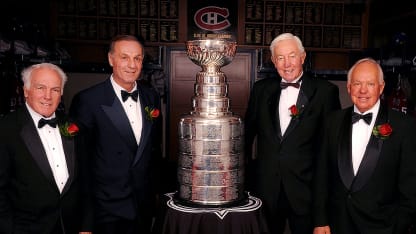Many have long maintained that Richard forever played in the shadow of his legendary older brother, Maurice "Rocket" Richard, 15 years his senior. That, Cournoyer said, wasn't the case at all.
"No, Henri didn't speak much with Maurice," the former forward said. "They were both of the same character but very individual men. If one didn't want to talk, maybe the other didn't either. But when Maurice passed away (in May 2000), I think you could see how sad Henri was. He didn't talk about it, but having known Henri for a long time, I know how it affected him. Maurice's death hit Henri very hard.
"Henri really like Maurice, especially later in life. Maurice refereed Canadiens alumni games and Henri played. They spent a lot of time together then. They travelled together on the buses, and maybe that's when they really got to be just brothers."
For Lafleur, the news Friday was just one more sad call, the Canadiens losing another legendary family member.
"I was very sad to hear of Henri's death," Lafleur said. "But on the other hand, he's been sick for so many years, and the quality of life had slipped badly. This is tough. As a teammate, Henri was one of the last warriors. When he played, he always gave 100 percent. He hated to lose."
And then, with a laugh: "And Henri hated his opponents. That's the way it was when he played."
Lafleur was coming into the NHL in the twilight of Richard's 20-season career. In fact, the forwards were roommates for what Lafleur remembers was about half a season.
"Henri was type of guy that, if you played lazy hockey, he'd tell you," Lafleur said. "He'd tell the guys before (coach) Scotty [Bowman] would. I've never seen a guy prouder than Henri was to wear the uniform. He inspired all of his teammates, put the same pride in us. He'd say, 'You have to be proud, we have to win the Stanley Cup.' It was never, 'You have to make the playoffs.'"
If Lafleur was immediately expected by fans and the Montreal media to step into the skates of the legendary Beliveau in his rookie year of 1971-72, Beliveau having just retired, Richard knew better.
Richard succeeded Beliveau as captain, and he had a bit of advice for the forward who would become one of the most exciting players of his generation.
"The first couple of years when I played, I wasn't playing well or regularly," Lafleur said. "So Henri said to me one day, 'Stop listening to Scotty and play your own style.' So that's what I did, and it worked."
Again, Lafleur laughed.
"Well, Henri and Scotty had a few arguments," he said.
Lafleur says it was a privilege to become close friends with Richard over many decades, doing many Canadiens promotions together during the offseason.
"It's something that I'll never forget, to have been able to play with a guy like that, and work with him in the summertime," he said.
Cournoyer will remember "a simple guy," a modest, humble champion who had an uncommon drive to win, whether it meant skating around or over an opponent.
"Sometimes, [coach Toe] Blake had to yell at him to come to the bench because he didn't want to come off," he said. "He loved to carry the puck. It was almost impossible to stop him. The other guy could have been 6-foot-5, but he didn't care.
"Henri's character was taller than that. He showed us how to win and how to be a good hockey player, both on and off the ice."

